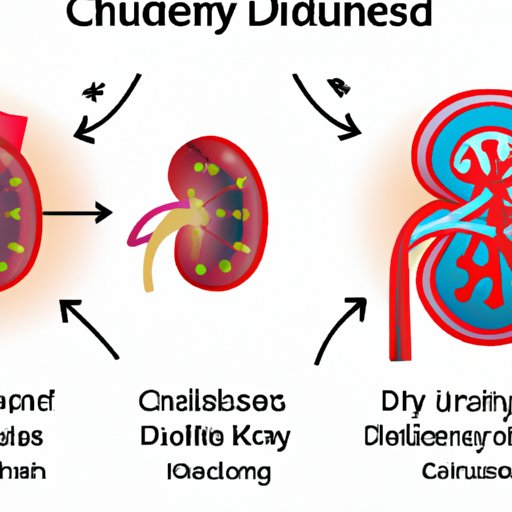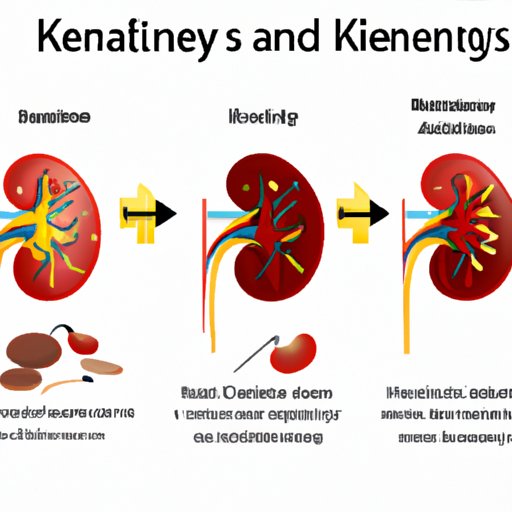
Introduction
Chronic Kidney Disease (CKD) is a severe condition that affects millions of people worldwide. CKD is characterized by gradual loss of kidney function over time. If left undiagnosed or untreated, it can lead to kidney failure and end-stage renal disease. The third stage of CKD, called Chronic Kidney Disease Stage 3, is where the damage is severe enough to cause symptoms. It’s essential to understand the signs, causes, and treatment options available to manage the disease. This article provides comprehensive information for people with Chronic Kidney Disease Stage 3 to help them understand the condition and take proactive steps in maintaining their quality of life.
Understanding Chronic Kidney Disease Stage 3: Symptoms, Causes, and Treatment Options
CKD is a condition that occurs when the kidneys aren’t filtering blood appropriately. When the kidneys are damaged because of an underlying health condition, such as diabetes or high blood pressure, they lose the ability to function correctly. Over time, this can lead to CKD. Stage 3 CKD is diagnosed when an individual has a glomerular filtration rate (GFR) ranging from 30 to 59 ml/min and shows symptoms of kidney damage.
Some of the most common symptoms of Chronic Kidney Disease Stage 3 include fatigue, sleep problems, muscle cramps, weakness, swollen feet and ankles, difficulty concentrating, and decreased urine output. If left untreated, these symptoms can lead to a more serious condition like end-stage renal disease, which requires dialysis or a kidney transplant for treatment.
The causes of Stage 3 CKD include diabetes, high blood pressure, inherited kidney diseases, and autoimmune diseases. The treatment options available for CKD include medications, lifestyle changes, and dialysis or kidney transplant for advanced stages of the disease.
What You Need to Know About Chronic Kidney Disease Stage 3: A Comprehensive Guide
Chronic Kidney Disease (CKD) is a progressive condition where the kidneys’ function deteriorates over time. It is classified into five stages, with stage 1 being the mildest and stage 5 being the most severe. As mentioned earlier, Stage 3 CKD is where the disease’s effects become evident.
It’s important to note that CKD is a silent disease, and many people may not have any symptoms until the disease’s later stages. Some of the common misconceptions about CKD include assuming that it only affects older adults, or people without any existing health conditions, or that it’s a minor kidney illness that will resolve on its own. However, that is not the case. CKD can affect anyone, and the extent of kidney damage will worsen without timely intervention.
Living with Chronic Kidney Disease Stage 3: Coping Strategies and How to Improve Your Quality of Life
Learning to cope with Chronic Kidney Disease Stage 3 can be challenging, but there are many strategies you can implement to improve your quality of life.
First, it is essential to have a comprehensive plan that covers lifestyle changes, medication, and treatment options like dialysis or transplant options. People living with CKD should eat a healthy diet, stay physically active, get enough sleep, manage stress, and avoid smoking and alcohol.
Coping strategies for CKD also include staying mentally positive, connecting with a support group or counselor, self-monitoring blood pressure and sugar levels if they have diabetes, and tracking urine output and weight. It’s also crucial to communicate with your healthcare provider to fine-tune medication and treatment options on an ongoing basis.
Chronic Kidney Disease Stage 3 Diet Plan: What To Eat and What To Avoid
A healthy diet is an essential aspect of managing CKD. There are some foods you should consume more of while avoiding others. Fresh fruits and vegetables, lean protein sources, whole grains, and low-fat dairy products should all be included in a CKD diet. In contrast, foods high in sodium, potassium, and phosphorus should be limited or avoided depending on your kidney function.
It’s also important to note that supplements containing high levels of vitamins and minerals like iron or magnesium should be avoided as they can contribute to kidney damage. To get a personalized CKD diet plan, consult with a registered dietitian or a nephrologist.
Managing Chronic Kidney Disease Stage 3: Tips for Taking Care of Yourself at Home
There are many things you can do at home to help manage Chronic Kidney Disease Stage 3. Daily care would involve managing your blood pressure and sugar levels if you have diabetes, monitoring your urine output and bodyweight, and taking your medication as prescribed.
Exercises that are recommended for CKD patients include walking, cycling, swimming, and yoga, while high-impact exercise and lifting-heavy weights should be avoided. Medical consultations are also crucial for CKD patients as their current medication regimens may need changes to accommodate their kidney function.

The Importance of Early Detection and Treatment of Chronic Kidney Disease Stage 3
Early detection and treatment of CKD can help slow down or prevent further damage to the kidneys. It’s essential to receive regular check-ups and screenings, especially if you’re at high risk for developing CKD.
One of the most significant benefits of early detection is the opportunity to implement lifestyle changes or take medication that can reduce the risk of advancing to later stages of CKD. Early intervention can also help prevent related complications like cardiovascular disease.
How to Slow Down the Progression of Chronic Kidney Disease Stage 3: Expert Advice and Success Stories
Slowing down the progression of CKD is possible with help from healthcare providers, dietitians, and other experts who specialize in CKD. Making lifestyle changes like maintaining a healthy weight and blood pressure, and managing other underlying health conditions can help improve kidney function.
Success stories of people managing CKD are also an inspiration for others with the same condition. These real-life examples demonstrate that with timely intervention, the right treatment and lifestyle changes, CKD can be managed effectively, and patients can lead fulfilling lives.
Conclusion
Chronic Kidney Disease Stage 3 is a condition that can affect anyone and is characterized by gradual deteriorating kidney function. It’s essential to understand the symptoms, causes, and treatment options available to manage the disease effectively. This comprehensive guide provides valuable information for people living with CKD to help them take proactive steps in managing their condition and improving their quality of life. Remember that early detection and treatment can slow down or prevent further damage to the kidneys, offering hope for a better future.




